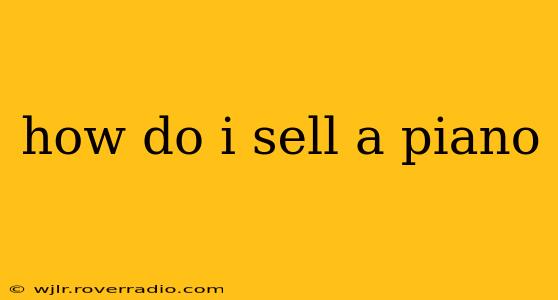How to Sell a Piano: A Comprehensive Guide
Selling a piano can seem daunting, but with a strategic approach, you can find the right buyer and get a fair price. This guide breaks down the process, from assessing your piano's value to finalizing the sale.
1. Assessing Your Piano's Value:
Before you list your piano, it's crucial to understand its worth. Several factors influence a piano's resale value:
- Make and Model: Established brands like Steinway & Sons, Yamaha, and Baldwin generally command higher prices than lesser-known manufacturers. The specific model also plays a role; older, more sought-after models can fetch premium prices.
- Condition: A well-maintained piano in excellent condition will sell for significantly more than one that's damaged or needs repairs. Consider any scratches, dents, tuning needs, or key issues.
- Age: The age of the piano is a key factor, with older instruments sometimes appreciating in value, especially if they are well-maintained and from a reputable brand.
- Type: Upright pianos generally sell for less than grand pianos, though the specific model and condition still influence the price.
How to determine the value:
- Online Resources: Websites like Reverb, eBay, and specialized piano forums often list similar pianos for sale, providing a benchmark.
- Appraisals: A professional piano appraiser can provide a formal valuation, particularly useful for older or valuable instruments. This is especially recommended for antique or high-end pianos.
2. Preparing Your Piano for Sale:
A well-presented piano is more likely to attract buyers. Here's how to prepare:
- Tuning: Have your piano professionally tuned. This is a must; a well-tuned instrument is far more appealing.
- Cleaning: Thoroughly clean the piano, both inside and out. Dust, polish, and even consider professional cleaning for stubborn stains.
- Minor Repairs: Address any minor issues, like replacing broken keys or tightening loose parts. Larger repairs might be cost-prohibitive but disclose any known problems honestly.
- High-Quality Photos: Take clear, well-lit photos that showcase the piano from various angles. Highlight its best features and avoid focusing on blemishes.
3. Choosing Your Sales Platform:
Several avenues exist for selling your piano:
- Online Classifieds: Craigslist, Facebook Marketplace, and similar sites offer a wide reach but require more effort in screening potential buyers.
- Specialized Piano Websites: Websites dedicated to musical instruments offer a more targeted audience of potential buyers who are already interested in pianos.
- Local Music Stores: Some music stores offer consignment sales, where they sell your piano on your behalf for a commission. This offers convenience but might result in a lower selling price.
- Consignment Shops: If you are located near an antique shop or general consignment shop specializing in large items, this could be a good option.
4. Setting Your Price:
Pricing your piano competitively is key. Research comparable pianos on the market to determine a fair asking price. You can always negotiate, but starting with a realistic price will attract more serious buyers.
5. Negotiating and Finalizing the Sale:
- Be Prepared to Negotiate: Buyers may try to haggle. Be firm but reasonable, especially if the piano has been on the market for a while.
- Payment Methods: Secure a safe payment method. Avoid cash-only transactions unless you are completely comfortable with the buyer. Consider using escrow services for larger transactions.
- Delivery: Discuss delivery and transportation arrangements upfront. Who is responsible for moving the piano? Consider professional movers for grand pianos.
- Documentation: Create a simple sales agreement outlining the terms of the sale, including the price, payment method, and delivery arrangements. This protects both parties.
How long does it take to sell a piano?
The timeframe for selling a piano varies depending on several factors, including the piano's condition, price, and the sales platform used. It can range from a few weeks to several months. Be patient and persistent.
What are the common mistakes to avoid when selling a piano?
- Overpricing: Setting an unrealistic price will deter potential buyers.
- Poor Presentation: Failing to clean and tune the piano can significantly impact its appeal.
- Lack of Proper Documentation: A formal sales agreement protects both the buyer and seller.
- Ignoring Safety Precautions: Ensure safe transport and payment methods to avoid scams or accidents.
By following these steps, you'll significantly increase your chances of a successful piano sale. Remember, patience and thorough preparation are key to maximizing your return.
